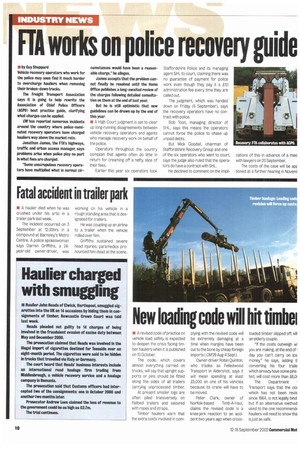FM works on police recovery guide
Page 10

If you've noticed an error in this article please click here to report it so we can fix it.
A by Guy Sheppard
Vehicle recovery operators who work for the police may soon find it much harder to overcharge hauliers when removing their broken-down trucks.
The Freight Transport Association says it is going to help rewrite the Association of Chief Police Officers (AGPO) best practice guide, clarifying what charges can be applied.
CM has reported numerous incidents around the country where police-nominated recovery operators have charged hauliers way above the market rate.
Jonathan James, the FTA's highways, traffic and urban access manager says problems arise when police play no part in what fees are charged.
Some unscrupulous recovery operators have multiplied what in normal cir
cumstances would have been a reasonable charge," he alleges.
James accepts that the problem cannot finally be resolved until the Home Office publishes a long-awaited review of the charges following detailed consultation on them at the end of last year But he is still optimistic that new guidelines can be drawn up by the end of this year.
• A High Court judgment is set to clear up long-running disagreements between vehicle recovery operators and agents who manage recovery work on behalf of the police.
Operators throughout the country complain that agents often do little in return for creaming off a hefty slice of their fees.
Earlier this year six operators took Staffordshire Police and its managing agent SHL to court, claiming there was no guarantee of payment for police work even though they pay it a £10 administration fee every time they are called out.
The judgment, which was handed down on Friday (6 September), says the recovery operators have no contract with police.
Bob Toon, managing director of SHL, says this means the operators cannot force the police to chase up unpaid debts.
But Mick Goodall, chairman of Staffordshire Recovery Group and one of the six operators who went to court, says the judge also ruled that the operators do have a contract with SHL.
He declined to comment on the impli cations of this in advance of a mee with lawyers on 20 September.
The costs of the case will be api tioned at a further hearing in Noveml




























































































































































